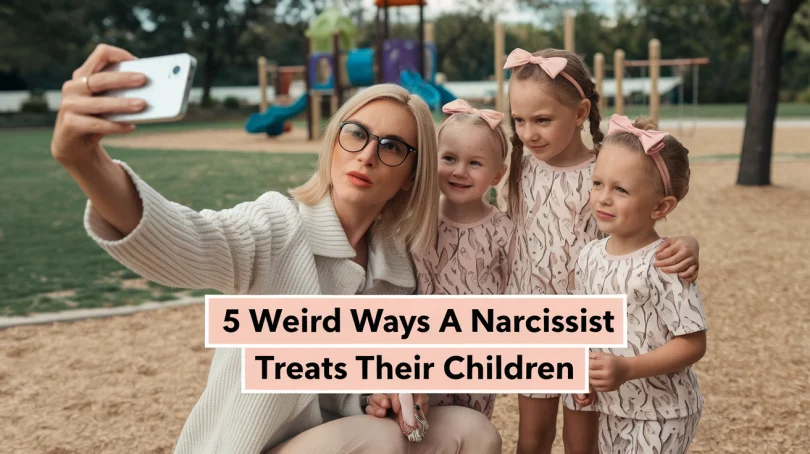Have you ever wondered how a narcissist’s unique mindset affects their parenting? In today’s topic, we’re diving into the unsettling world of narcissistic parenting to reveal five strange and unexpected ways narcissists treat their children. From manipulative games to a twisted sense of control, these behaviors aren’t just peculiar they can leave lasting emotional scars. Whether you’re trying to understand a narcissistic parent in your life or want to learn more about this troubling phenomenon, stick around as we uncover the shocking truths behind these unusual parenting tactics.
Narcissists Prioritize Their Desires Over Their Child’s Needs
A narcissistic parent’s focus on their desires, coupled with a lack of regard for their child’s individuality, can severely hinder a child’s emotional development and sense of self. Children often grow up feeling that they must constantly perform and achieve to be valued and loved. This leads to long-term struggles with self-esteem and identity. Narcissistic parenting not only stifles personal growth but perpetuates a cycle of dependency and approval-seeking behavior, leaving the child unequipped to navigate life on their terms.
Emotional Manipulation and Guilt
Narcissistic parents are masters of emotional manipulation, often using guilt as a powerful tool to control and dominate their children. This manipulation exploits the child’s emotions, eliciting responses or behaviors that align with the parent’s desires. For example, the narcissistic parent might say things like, “After all I’ve done for you, this is how you repay me?” or “I sacrificed so much, and you can’t even do this one thing for me.” These guilt-tripping statements are designed to make the child feel responsible for the parent’s happiness, coercing them into compliance.
Over time, this constant manipulation erodes the child’s self-esteem, making them believe they are inherently flawed unless they meet the parent’s unrealistic expectations. This emotional control often leads to a chronic need for approval, fear of rejection, and an inability to assert boundaries well into adulthood.
The Golden Child vs. Scapegoat Dynamic
A hallmark of narcissistic parenting is the division of children into the roles of the “Golden Child” and the “Scapegoat.” The Golden Child is often idealized and given praise and attention, expected to reflect the parent’s perfection and uphold their unrealistic expectations. While these children may appear favored, they also endure immense pressure to succeed, leading to anxiety and fear of failure. Their self-worth becomes tightly tied to the parent’s approval, making it difficult to form an identity independent of parental validation.
Conversely, the Scapegoat bears the blame for the family’s problems, subjected to excessive criticism and punishment. The constant berating can destroy their self-esteem, leaving them feeling unloved and unworthy. This toxic dynamic fosters rivalry, jealousy, and resentment among siblings, while simultaneously keeping them dependent on the narcissistic parent’s limited approval.
Invasion of Privacy
Narcissistic parents often view their children as extensions of themselves, not as individuals with their rights. As a result, they may invade their child’s privacy as a way to exert control. This can manifest as constant surveillance reading diaries, checking phone messages, or eavesdropping on conversations. Such behaviors send a message that the child has no right to privacy and that the parent’s control is absolute.
This invasion can lead to severe psychological consequences, such as a lack of trust and an inability to establish healthy boundaries. Children raised in such environments often struggle with feelings of vulnerability and insecurity, which can persist into adulthood, affecting their ability to form intimate, trusting relationships.
Conditional Love and Approval
Unlike healthy parents, who offer unconditional love, narcissistic parents dispense affection and approval only when their children meet specific expectations. These children quickly learn that love is not freely given but must be earned by adhering to the parent’s standards, whether academic, behavioral, or personal.
When children fail to meet these expectations, they face coldness, criticism, or outright rejection. This conditional love teaches them that their worth is tied to external achievements rather than their inherent qualities. As adults, they often struggle with feelings of unworthiness and fear of rejection, making it difficult to form healthy relationships. The belief that love must be earned leads to a lifelong pursuit of approval at the expense of their well-being.
As we wrap up today’s exploration of the unsettling ways narcissists treat their children, it’s essential to remember that recognizing these patterns is the first step toward understanding and healing. If you or someone you know has experienced this, you are not alone. Awareness empowers you to break free from the cycle and reclaim your sense of self.






Leave a Comment